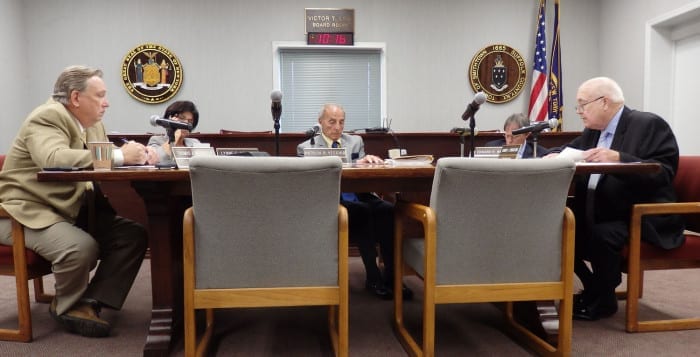Smithtown residents will have some choices to make come November, as two candidates have stepped up to challenge incumbent councilmen Bob Creighton (R) and Ed Wehrheim (R).
Democrat Larry Vetter and Republican Lisa Inzerillo are both running for Smithtown Town Board, but they have differing views on what to do when they get there.
Vetter, 62, said he believes he will bring a new view to Smithtown if elected.
“I look at things from a different perspective,” Vetter said. “I come from a different background.”
Vetter, of Smithtown, comes from the private sector and has owned an environmental consulting firm, Vetter Environmental Science, for the past seven years.

Among the biggest issues he said he thinks Smithtown is facing right now is a reinvigoration of the downtown area. Vetter said he wants to find new and innovative ways to find revenue and cut costs, to help fight the brain drain he believes Smithtown is currently experiencing, driving youth out of town.
“I know what it’s like to raise a family and see them leave, it’s disappointing,” he said. “Both of my children have left Long Island and are probably not coming back. Young people are constantly getting educated here and then leaving.”
Vetter said he would work with an industrial development association as other townships have done to retain youth.
Vetter also spoke of tax breaks and different incentives that could be given to businesses that develop in Smithtown.
Lisa Inzerillo, 50, a business owner from Kings Park, is also focusing on the issues of developing a more vital downtown business district.
If elected, Inzerillo said in an email that she plans to “use my influences to require our town planning and development staff to aggressively pursue state and federal grants designed toward revitalizing our downtown areas.”
Inzerillo said her stance on the environment is what sets her apart from her challengers.
“I am the only candidate that wants to protect the environment, green spaces, and quality of life,” she said. “Misguided development, contamination of our environment and abuse of sensible town zoning regulations will be at the top of my agenda.”
Both incumbents Wehrheim and Creighton said they felt that economic growth in the downtown area is key to ensuring that Smithtown continues to prosper.
“We need to ensure that the commercial tax base remains stable or is increasing,” Wehrheim said in a phone interview. “The healthier that is, the better able we are to keep residential taxes stable.”

The redevelopment of the Smith Haven Mall, as well as adding larger stores like Bob’s Discount Furniture to the Smithtown area are all projects that Wehrheim worked on during his last three terms, some with Creighton’s involvement as well.
Wehrheim also said that he intends to use bonding to help fund more projects in the downtown area. If elected, this will be Wehrheim’s fourth term in office.
When speaking on Creighton and himself, Wehrheim said, “I feel that we have a vast amount of government experience in Smithtown government. I believe firmly that our experience and dedication shows we’re the right people to put in office.”
Increased development is something that Creighton said is a perfect example of smart growth, and would encourage new businesses to come into Smithtown.
“We must do something to generate commercial enterprises,” Creighton said. “There are too many empty stores.”
Recently, a proposal to restructure Smithtown’s government has come to the attention of the board. Creighton brought the idea to the board and stressed that while it is still only in the proposal stage, it could lead to more accountability and cooperation in Smithtown’s government.
The restructuring would create four commissioner positions that would each look over approximately five to six department heads. Creighton believes this would be more successful than having all 26 department heads answer to Supervisor Pat Vecchio (R).
Wehrheim supported the proposal of this idea. If elected, this would be Creighton’s third term as councilman. He was elected to office in 2008, and Wehrheim was elected in 2003.
















